INVITED SPEAKERS
Some plenary sessions will take place in the main auditorium and some others online. In any case they will involve all conference participants.
If you are a remote attendee you can watch and interact via ZOOM or just watch via FaceBook. Modality is indicated for each speaker.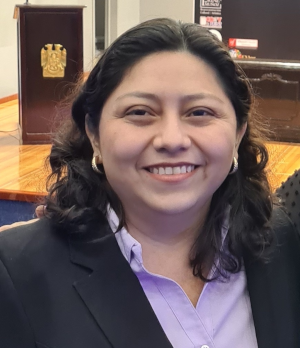
Universidad Juárez Autónoma de Tabasco
Online
https://perfil.ujat.mx/addy.bolivar
Spanish version
Se graduó de la
Licenciatura en Matemáticas de la Universidad
Autónoma de Yucatán en el 2004. Obtuvo la Maestría
y el Doctorado en Ciencias con Orientación en
Probabilidad y Estadística en el Centro de
Investigación en Matemáticas (CIMAT), en
Guanajuato, México, en 2007 y 2011,
respectivamente. Realizó una estancia posdoctoral
en Rice University, Houston, Texas, USA, en el
2011 y 2012. Desde el 2013 se desempeña como
Profesora Investigadora de la División Académica
de Ciencias Básicas de la Universidad Juárez
Autónoma de Tabasco (DACB-UJAT). Sus áreas de
interés son Estadística Multivariada y Ciencia de
Datos, cuyas aplicaciones se encuentran en campos
tales como genómica, análisis de imágenes médicas,
reconocimiento de texto, finanzas, entre
otros. Participa constantemente en la divulgación
de las matemáticas en el estado de Tabasco,
impartiendo pláticas en escuelas preparatorias y
organizando eventos académicos y seminarios de
divulgación científica. Es miembro del Sistema
Nacional de Investigadores del CONAHCYT en el
Nivel II, Miembro del Sistema Estatal de
Investigadores de Tabasco y cuenta con el
Reconocimiento a Perfil Deseable PRODEP de la
SEP. En el 2018 obtuvo el Reconocimiento al Mérito
Científico de la DACB-UJAT; en el 2022 obtuvo la
distinción Mentora en la Ciencia por el British
Council. Es la líder del cuerpo académico
Consolidado “Modelación Estocástica y
Estadística”. Por otro lado, funge como la
Presidenta de la Comisión de Equidad de Género de
la DACB-UJAT, cuya función es la promoción de la
igualdad de género y la erradicación de la
violencia en la comunidad universitaria.
English version
She
graduated with a Bachelor's degree in Mathematics
from the Universidad Autónoma de Yucatán in
2004. She earned her Master's and Ph.D. in
Sciences with a focus on Probability and
Statistics from the Centro de Investigación en
Matemáticas A.C. (CIMAT) in Guanajuato, Mexico, in 2007
and 2011, respectively. She completed a
postdoctoral fellowship at Rice University,
Houston, Texas, USA, in 2011 and 2012. Since 2013,
she has been a Research Professor at the Academic
Division of Basic Sciences of the Universidad
Juárez Autónoma de Tabasco (DACB-UJAT). Her areas
of interest are Multivariate Statistics and Data
Science, with applications in fields such as
genomics, medical image analysis, text
recognition, finance, among others. She is
actively involved in the dissemination of
mathematics in the state of Tabasco, giving talks
at high schools and organizing academic events and
scientific outreach seminars. She is a member of
the Sistema Nacional de Investigadores (SNI) of
CONAHCYT at Level II, a member of the State System
of Researchers of Tabasco, and holds the
Recognition of Desirable Profile PRODEP from the
SEP. In 2018, she received the Scientific Merit
Award from DACB-UJAT; in 2022, she was honored as
a Mentor in Science by the British Council. She is
the leader of the consolidated academic group
"Stochastic Modeling and Statistics."
Additionally, she serves as the President of the
Gender Equity Commission of DACB-UJAT, whose role
is to promote gender equality and eradicate
violence within the university community.
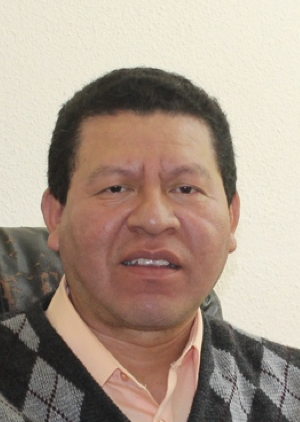
Universidad Tecnológica de la Mixteca
Instituto de Física y Matemáticas
Live
https://orcid.org/0000-0002-7864-1778
Spanish version
Licenciado en
Matemáticas por la Universidad Juárez Autónoma de
Tabasco (2002), Maestría en Ciencias con
especialidad en Probabilidad y Estadística por el
Centro de Investigación en Matemáticas (2004) y
Doctorado en Estadística Aplicada por el Colegio
de Postgraduados (2016). En 2023 realizó una
estancia posdoctoral en la Universidad de
Sonora. Desde septiembre de 2004 es
Profesor-Investigador de la Universidad
Tecnológica de la Mixteca en el Instituto de
Física y Matemáticas, en donde ha impartido cursos
de Probabilidad y Estadística en la Licenciatura
en Matemáticas Aplicadas, ha dirigido trece tesis
de licenciatura en Matemáticas Aplicadas y ha
sido revisor de quince. Pertenece al núcleo
académico básico de la maestría y doctorado en
modelación matemática. Ha sido director y
colaborador de diferentes proyectos de
investigación con financiamiento. Tiene el
Reconocimiento a Perfil Deseable para Profesores
de Tiempo Completo por parte de PRODEP y desde
2021 es miembro del Sistema Nacional de
Investigadores. Sus áreas de interés son Procesos
Estocásticos y Teoría de Valores Extremos, en
particular Extremos Espacio-Temporales.
English version
Bachelor's
degree in Mathematics from the Universidad
Autónoma de Tabasco (2002), Master of Science with
a specialization in Probability and Statistics
from the Centro de Investigación en Matemáticas A.C.
(CIMAT)
in 2004, and Ph.D. in Applied Statistics from the
Colegio de Postgraduados in 2016. In 2023, he
completed a postdoctoral fellowship at the
Universidad de Sonora. Since September 2004, he
has been a Professor-Researcher at the Universidad
Tecnológica de la Mixteca in the Instituto de
Física y Matemáticas, where he has taught courses
in Probability and Statistics in the Bachelor's
degree program in Applied Mathematics. He has
supervised thirteen undergraduate theses in
Applied Mathematics andand reviewed fifteen. He is
a member of the core academic faculty for the
Master's and Ph.D. programs in Mathematical
Modeling. He has been the director and
collaborator on various funded research
projects. He holds the Recognition of Desirable
Profile for Full-Time Professors from PRODEP and
has been a member of the Sistema Nacional de Investigadores
(SNI) since 2021. His areas of interest
are Stochastic Processes and Extreme Value Theory,
particularly Spatio-Temporal Extremes.
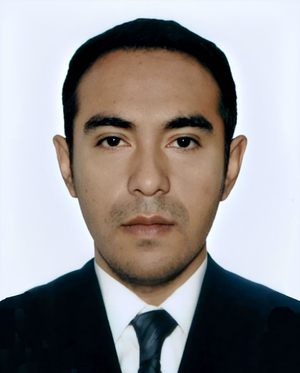
Université Clermont Auvergne
Online
https://www.limos-
-365
Spanish version
Soy doctor en
matemáticas por la Universidad Nacional Autónoma
de México y doctor en Ciencias de la Computación
por la Universidad Clermont Auvergne. Las áreas en
las que trabajo actualmente son las matemáticas
discretas, la investigación de operaciones y la
optimización combinatoria. Mi trabajo se centra
principalmente en aplicaciones de las matemáticas
y la informática a problemas de apoyo a la
decisión. En particular, he trabajado en el
desarrollo de modelos exactos o con cierta
garantía de optimalidad, para resolver problemas
de enrutamiento de flotas de vehiculos con
transferencias y horizonte de tiempo. Actualmente
trabajo como asociado temporal de docencia e
investigación en el Instituto Superior de
Informática, Modelación y sus Aplicaciones (ISIMA)
en la ciudad de Clermont-Ferrand, Francia.
English version
I hold a
Ph.D. in Mathematics from the Universidad Nacional
Autónoma de Mexico and a Ph.D. in Computer
Science from the University of Clermont
Auvergne. My current research areas include
discrete mathematics, operations research, and
combinatorial optimization. My work primarily
focuses on applying mathematics and computer
science to decision support problems. In
particular, I have worked on developing exact
models or models with certain optimality
guarantees to solve vehicle fleet routing problems
with transfers and time horizons. I am currently
working as a temporary teaching and research
associate at the Higher Institute of Informatics,
Modeling, and Applications (ISIMA) in
Clermont-Ferrand, France.
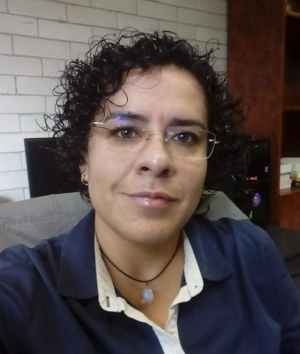
Universidad Nacional Autónoma de México
Live.
https://www.fciencias-
-54005
Spanish version
Lizbeth
Naranjo Albarrán es Profesora de Tiempo Completo
Titular A del área de Estadística en el
Departamento de Matemáticas de la Facultad de
Ciencias, UNAM; pertenece al Sistema Nacional de
Investigadores de CONAHCyT (SNI I). Estudió la
Licenciatura en Actuaría en la Facultad de Ciencias
de la UNAM, la Maestría en Ciencias Matemáticas de
la UNAM, y el Doctorado en Matemáticas en la
Universidad de Extremadura, España. Tiene más de
doce años de experiencia en docencia dentro del
área de Estadística. Su área de investigación es
el análisis Bayesiano de datos con respuesta
categórica, errores de medición, y modelos
lineales generalizados. Actualmente es
Vicepresidenta de la Asociación Mexicana de
Estadística (AME).
English version
Lizbeth
Naranjo Albarrán is a Full-Time Professor,
Category A, in the area of Statistics in the
Department of Mathematics at the Faculty of
Sciences, UNAM. She is a member of the Sistema
Nacional de Investigadores of CONAHCyT at level I. She
earned her Bachelor's degree in Actuarial Science
from the Faculty of Sciences at UNAM, a Master's
degree in Mathematical Sciences from UNAM, and a
Ph.D. in Mathematics from the Universidad de
Extremadura, Spain. She has over twelve years of
teaching experience in the field of
Statistics. Her research area focuses on the
Bayesian analysis of data with categorical
responses, measurement errors, and generalized
linear models. She is currently the Vice President
of the Mexican Statistical Association (AME).
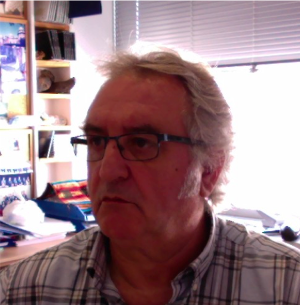
Universidad de Cádiz
Instituto de Investigación Marina
Online
https://www.prod-
-detalle.html
Spanish version
En 1986;
después de finalizar la Licenciatura en
Matemáticas (Astronomía, Geodesia y Mecánica
Celeste) en la UCM, ingreso en el Servicio de
Satélites de la Sección de Geofísica del Real
Instituto y Observatorio de la Armada
(ROA). Participo en la puesta en marcha de los
equipos GPS geodésicos que llegan a España para
las primeras campañas antárticas españolas en
1987-88 y posteriores; en las que participo
directamente en el establecimiento de la red
antártica RGAE; siendo responsable de su cálculo y
ajuste; así como de la red geodinámica REGID para
modelizar la actividad volcánica de la isla
Decepción. Mi tesis doctoral tuvo como resultados
principales el establecimiento de las redes RGAE y
REGID; su enlace con el continente sudamericano, y
la obtención del primer modelo geodinámico para la
isla Decepción. En 1989, fui nombrado profesor de
la Escuela de Estudios Superiores de la Armada con
docencia en Geodesia Clásica y Espacial. En 1996,
ingreso en la Universidad de Cádiz; obteniendo la
titularidad universitaria en 1998. Actualmente
imparto Astronomía y Geodesia y Satélites
Artificiales y Geomática en el Grado de
Matemáticas de la Facultad de Ciencias. En 2017
obtuve la plaza de Catedrático de Universidad. Mi
participación en la investigación antártica se
remonta a la campaña 89-90. Desde entonces y
durante 19 campañas he estado vinculado
directamente. He dirigido 4 tesis doctorales de
Geodesia y Geodinámica Antártica, donde se aprecia
la evolución experimentada hasta llegar a utilizar
el sistema GNSS para la vigilancia volcánica en
tiempo real. Actualmente, se ha diseñado un
sistema MVMS para vigilancia en tiempo real que
integra múltiples sensores. En 2000, creo el grupo
de investigación RNM314 Geodesia y Geofísica. A
partir de aquí el reto es enorme, sobre todo en la
formación de jóvenes investigadores en Geodesia y
Satélites Artificiales. Pero es en los últimos
años cuando este gran esfuerzo está empezando a
tener su rendimiento. En el grupo hay 7 doctores
jóvenes perfectamente capacitados para la
investigación geodésica aplicada a la geodinámica
tectónica y volcánica (modelización, seguimiento y
vigilancia). En 2005, diseño y establecemos la Red
Andaluza de Posicionamiento (Instituto de
Estadística y Cartografía de Andalucía);
responsabilizándonos hasta 2017 de su operatividad
y de su control de calidad geodésico. Esta
infraestructura ha supuesto un enorme avance para
los estudios de una región tan compleja
geodinámicamente como Andalucía; así, hemos
establecido modelos precisos estructurales
correlacionando la deformación con la sísmica
(IAG-UGR). Participamos en el seguimiento de la
crisis volcánica ocurrida en Tenerife, 2004,
mediante la transferencia de métodos y técnicas
diseñadas en la Antártida y sus objetivos
geodinámicos; estableciendo un primer modelo
cinemático para la isla. Pero, es con motivo del
proceso volcánico de El Hierro (2011-2014) cuando
la experiencia antártica tiene su máxima
expresión. Colaboramos con el IGEO-CSIC y con el
IGN en el diseño y desarrollo de la red de
seguimiento geodésico; establecemos pronósticos en
tiempo cuasi-real en base al parámetro deformación
superficial a partir del concepto DIESID
desarrollado en la isla Decepción; y estudiamos la
evolución de las fuentes de presión litosférica y
su aplicación para establecer modelos de
peligrosidad. Finalmente, indicar que también se
han transferido a los volcanes Concepción
(Nicaragua) y recientemente en el Popocatépetl
(México). En el aspecto formativo he dirigido o
codirigido 10 tesis doctorales todas ellas en la
línea de investigación de geodesia y sistemas GNSS
y sus aplicaciones a la geodinámica tectónica y/o
volcánica.
English version
In 1986,
after completing my Bachelor's degree in
Mathematics (Astronomy, Geodesy, and Celestial
Mechanics) at UCM, I joined the Satellite Service
of the Geophysics Section at the Royal Institute
and Observatory of the Navy (ROA). I participated
in the launch of the geodetic GPS equipment that
arrived in Spain for the first Spanish Antarctic
campaigns in 1987-88 and subsequent ones, where I
was directly involved in establishing the
Antarctic RGAE network, being responsible for its
calculation and adjustment, as well as the REGID
geodynamic network to model the volcanic activity
of Deception Island. The main results of my
doctoral thesis were the establishment of the RGAE
and REGID networks, their connection with the
South American continent, and the creation of the
first geodynamic model for Deception Island.
Currently, I teach Astronomy and Geodesy and
Artificial Satellites and Geomatics in the
Mathematics degree program at the Faculty of
Sciences. In 2017, I was appointed Professor at
the Universidad de Cádiz. My involvement in
Antarctic research dates back to the 1989-90
campaign. Since then, I have been directly
involved in 19 campaigns. I have supervised 4
doctoral theses in Antarctic Geodesy and
Geodynamics, showcasing the evolution to using the
GNSS system for real-time volcanic
monitoring. Currently, a real-time monitoring
system (MVMS) integrating multiple sensors has
been designed.
In 2000, I established the RNM314 Geodesy and
Geophysics research group. From here, the
challenge is enormous, especially in training
young researchers in Geodesy and Artificial
Satellites. However, it is in recent years that
this significant effort has begun to pay off. The
group includes 7 young doctors well-qualified for
geodetic research applied to tectonic and volcanic
geodynamics (modeling, monitoring, and
surveillance).
In 2005, we designed and established the
Andalusian Positioning Network (Institute of
Statistics and Cartography of Andalusia),
overseeing its operation and geodetic quality
control until 2017. This infrastructure has
represented a tremendous advance for studies in a
geodynamically complex region like Andalusia. We
have established precise structural models
correlating deformation with seismic activity
(IAG-UGR). We participated in monitoring the
volcanic crisis in Tenerife in 2004 by
transferring methods and techniques designed in
Antarctica with its geodynamic objectives,
establishing the first kinematic model for the
island.
However, it was during the volcanic process of El
Hierro (2011-2014) that Antarctic experience
reached its peak. We collaborated with IGEO-CSIC
and IGN in designing and developing the geodetic
monitoring network, making near-real-time
forecasts based on the surface deformation
parameter derived from the DIESID concept
developed on Deception Island, and studying the
evolution of lithospheric pressure sources and
their application to hazard modeling. Finally,
these techniques have also been transferred to
Concepción volcano (Nicaragua) and recently to
Popocatépetl (Mexico).
In terms of training, I have supervised or
co-supervised 10 doctoral theses, all in the
research area of geodesy and GNSS systems and
their applications to tectonic and/or volcanic
geodynamics.

Universidad del Papaloapan
Live
https://www.unpa-
-rez.html
Spanish version
Pérez-Castro es profesora-investigadora de
tiempo completo, adscrita al Instituto de
Agroingeniería de la Universidad del Papaloapan,
campus Loma Bonita Oaxaca, desde el año
2018. Obtuvo su Grado de Doctora en Inteligencia
Artificial en el Instituto de Investigaciones en
Inteligencia Artificial (IIIA) de la Universidad
Veracruzana. Cuenta con el reconocimiento de
Perfil Deseable (PRODEP) y pertenece al Sistema
Nacional de Investigadores Nivel Candidato del
CONAHCYT. Es autora y coautora de varios
artículos publicados en revistas indexadas en el
JCR, así como en revistas arbitradas y congresos
nacionales e internacionales. Su investigación se
ha centrado en el estudio y aplicación de
Inteligencia Computacional para asistir en la
solución de problemas que involucran la
optimización metaheurística y métodos de
aprendizaje computacional. Recientemente, se ha
involucrado con otras áreas y disciplinas donde la
Inteligencia Artificial puede aportar alternativas
de solución como: la agricultura de precisión,
medio ambiente y ecología de poblaciones.
English version
Pérez-Castro
is a full-time professor-researcher at the
Agroengineering Institute of the Universidad del
Papaloapan, Loma Bonita, Oaxaca campus, since
2018. She earned her Ph.D. in Artificial
Intelligence from the Institute of Research in
Artificial Intelligence (IIIA) at the Universidad
de Veracruz. She holds the Recognition of
Desirable Profile (PRODEP) and is a Candidate
Level member of the Sistema Nacional de Investigadores
(CONAHCYT). She is the author and co-author of
several articles published in JCR-indexed
journals, as well as in peer-reviewed journals and
national and international conferences. Her
research has focused on the study and application
of Computational Intelligence to assist in solving
problems involving metaheuristic optimization and
computational learning methods. Recently, she has
become involved in other areas and disciplines
where Artificial Intelligence can provide
alternative solutions, such as precision
agriculture, environment, and population ecology.





